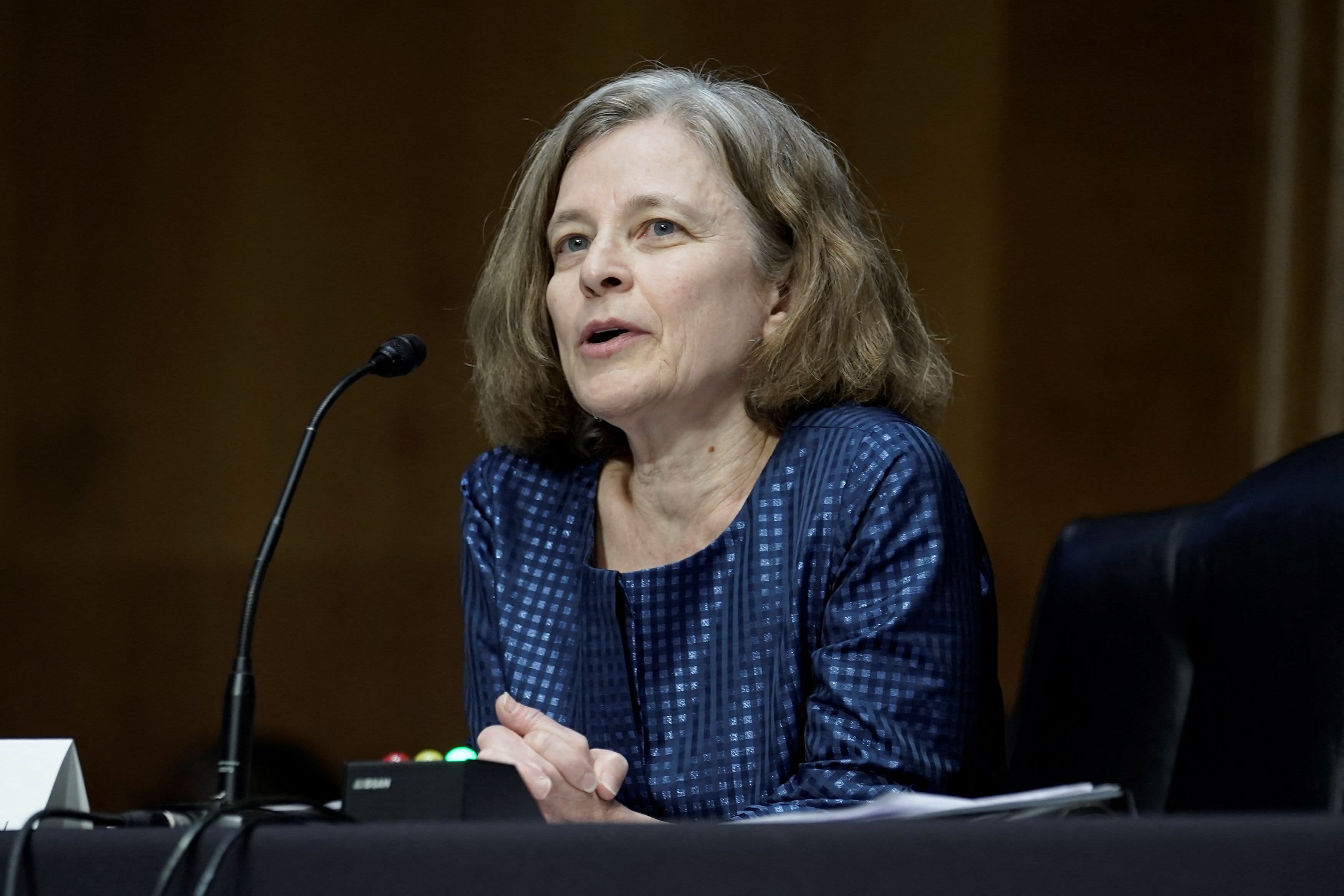
Sarah Bloom Raskin, President Joe Biden’s pick to be the Federal Reserve’s banks regulator, called Kansas City Fed President Esther George in 2017 to advocate for a fintech company that had been denied special access to the central bank’s payments system, according to a new letter from Republican Sen. Pat Toomey.
At the time, Raskin had just joined the board of the firm, Reserve Trust. The fintech company — like many others — had hoped the Fed would grant it access to a master account.
Earlier in 2017, Raskin had left her role as the Treasury Department’s deputy secretary. Prior to her Treasury work, Raskin spent over three years at the Federal Reserve as one of its governors.
After Raskin’s personal intervention on behalf of Reserve Trust, the Kansas City Fed approved the company’s second request for an account in 2018.
Toomey, R-Penn., in a letter sent to the Kansas City Fed, said George herself revealed to him that Raskin made the 2017 call to advocate for Reserve Trust.
“On the evening of February 2, 2022, you and your staff spoke with my staff,” Toomey told George in his letter. “On that you call, you revealed that Ms. Raskin had, in fact, personally called you about Reserve Trust’s master account application after it had been denied.”
The letter from Toomey, the ranking member on the Senate Banking Committee, came over a week after Raskin faced grilling from Senate Republicans during her confirmation hearing to be the next Fed vice chair for supervision, to replace Randal Quarles.
Sen. Cynthia Lummis, R-Wyo., asked Raskin several times whether she had lobbied on behalf of Reserve Trust. Raskin dodged all of the questions.
Raskin, who received equity in Reserve Trust when she joined its board, sold her financial stake upon her 2019 departure from the company for about $1.5 million.
To this day, Reserve Trust’s exclusive master account remains the company’s single largest selling point to potential customers. It is the first thing the company says about itself on the homepage of its website.
“Reserve Trust is the first fintech trust company with a Federal Reserve master account,” reads the homepage for ReserveTrust.com. “We provide payments services that financial institutions and fintechs have previously only been able to obtain from correspondent and sponsor banks.”
Toomey’s letter to George opens by accusing the Kansas City Fed of “continued stonewalling of reasonable requests for information,” which he called “unacceptable.”
The letter says that George has refused to provide evidence that the regional Fed bank’s decision to reverse course on the company’s request was not based on Raskin’s lobbying, but “because of a change of of circumstances” in the status of Reserve Trust’s business model and another factor.”
The Kansas City Fed said this week that it decided to grant Reserve Trust’s master account application after the company “changed its business model and the Colorado Division of Banking reinterpreted the state’s law in a manner that meant [Reserve Trust] met the definition of a depository institution.”
And the Kansas City Fed had said it was “routine” for it to communicate with management, including directors, of a company seeking a decision from the Kansas City Fed.
But Toomey’s letter said George had told him that “you are not aware of ever receiving a call from a former Fed Governor on behalf of an organization seeking a decision from the Kansas City Fed.”
“That’s saying something since you have been an official at the Kansas City Fed for forty years, spending the last decade as the bank’s President,” Toomey added. “In light of the Kansas City Fed’s assurances that it acted ethically and reasonably, I am puzzled as to why it continues to stonewall a legitimate congressional oversight inquiry,” Toomey wrote.
In a separate letter to Federal Reserve Chairman Jerome Powell, whom Biden has nominated to a second term in the role, Toomey wrote that Fed staff had said they wouldn’t answer a question on Raskin’s purported communication with the Fed regarding Reserve Trust.
“One very simple, yet important, question we asked the Fed is whether Ms. Raskin communicated with anyone at the Fed on behalf of Reserve Trust,” Toomey wrote. “In a phone call on February 8, 2022, Fed staff notified my staff that the Fed does not intend to answer this question.”
Following Raskin’s confirmation hearing last week, the White House defended its candidate, whom Biden nominated in January. The White House called Lummis’ claims “false.”
“Sarah Bloom Raskin has always taken her ethical obligations very seriously during and after her public service,” the White House told CNBC on Feb. 3.
“Senator Lummis engaged [in] innuendo with no facts presented to back up her false claims,” the administration added at the time. “If Senator Lummis had any information to back up her innuendo she would have presented it at the hearing.”
While it is not uncommon for company directors to call the Fed to ask for special consideration, at the time Raskin called she was a freshly retired top government official.
Lummis did not suggest that Raskin’s actions were illegal, but rather an example of the “revolving door” between politics and corporate interests. The “revolving door” model suggests that former government officials will use their connections and clout in government to later lobby on behalf on corporate interests for a payout.




